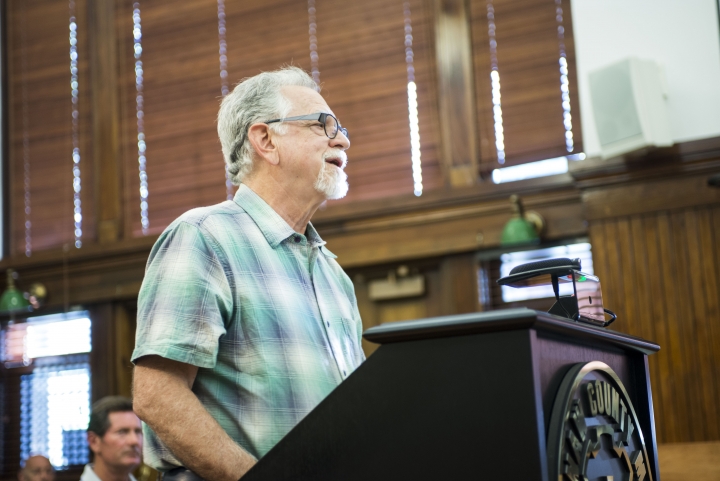
Citing more than three decades of disappointment with state environmental regulators, local authorities in Washtenaw County are increasing their support for the designation of a toxic plume of groundwater as an Environmental Protection Agency Superfund site — a federal designation for areas in need of major clean up of harazdous substances.
Such a move would prompt federal intervention that would largely bypass the Michigan Department of Environmental Quality, though other local officials have expressed reservations that doing so would merely hurt local property values and undermine the DEQ’s efforts.
Improper wastewater disposal by the Ann Arbor-based company Gelman Sciences from 1966 to 1986 created a large plume of the carcinogenic toxin 1,4-dioxane underneath Ann Arbor, as well as Scio and Ann Arbor Townships. The gradually expanding plume has contaminated groundwater, forced the closure of more than 100 private residential wells and is expected to reach the Huron River in the coming decades and potentially contaminate Ann Arbor’s water source at Barton Pond.
Wednesday evening, the Washtenaw County Board of Commissioners voted unanimously for a resolution supporting a petition to the EPA for Superfund status. The Commission joins the Scio Township Board of Trustees, which voted in favor of a Superfund petition June 20, and Ann Arbor Charter Township — a separate municipality from the city of Ann Arbor — that passed its own resolution of support in March.
Despite the outcome of the vote, the Ann Arbor City Council has not formally voted on a Superfund petition, and Mayor Christopher Taylor — as well as several councilmembers — told the Daily in March that a premature petition could bring unintended harm to property values.
Wednesday, Taylor told the Daily the city is still unsure of whether or not it will back a petition for superfund status — though he didn’t rule out eventually supporting such a petition — and that he doesn’t expect City Council to debate the issue in the immediate future.
“The question of whether or not to seek Superfund status is a complicated one,” Taylor said, pointing out that city staff members are continuing to work with other county stakeholders to understand the issue. “If we were to seek superfund designation, we would probably require a large amount of community input and a full understanding of how successful (the) EPA has been with respect to other dioxane sites in Michigan, what we could hope to achieve by obtaining that designation and frankly what risks we’d run by doing this.”
Scio Township Supervisor Spaulding Clark — who supports a Superfund designation — told the Daily before the county’s vote that whether a superfund petition is ultimately pursued may rest with the city of Ann Arbor’s decision. Clark also said he has more confidence in the EPA than the DEQ to manage the contamination, and that he believes concerns about loss in property values are unfounded because affected properties still have access to public water and that the contamination has been long-known to realtors and home buyers.
“If both the county and the city have no interest in making this a Superfund site, my guess is it won’t happen,” Clark said. “I think the reality is that Ann Arbor Township and Scio Township are awaiting a decision by Ann Arbor Township and the county as to whether they want to get into this.”

Although the DEQ and Pall Corporation — which acquired Gelman — have maintained a network of monitoring wells to track the plume since 1992, Washtenaw County locals have long been critical of the state’s response, and the Flint water crisis re-energized public attention in January.
In March, the DEQ promised to revise groundwater safety standards for 1,4-dioxane to be in line with EPA cancer risk guidelines, which would grant the Michigan Attorney General standing to take new legal action against Pall Corporation for more thorough cleanup and remediation activities. In a June interview, Robert Wagner, chief of the DEQ Remediation Division, told the Daily the new regulations are on track to be submitted to the state legislature for approval in its 9-month timeframe.
Nonetheless, a persistent dissatisfaction with the DEQ’s bureaucracy was visible in the county commission’s meeting, particularly with Commissioner Yousef Rabhi (D).
“We’re dealing with an organization that has ignored us for too long … that has set timelines and then broken their timelines, and I personally have no interest in continuing to be fooled by an organization that isn’t being held true to its own standards,” Rabhi said at the County Commission session. “I don’t believe it is the fault of the staff on the ground … but the DEQ is fundamentally flawed in its structure; the DEQ does not serve the people of Michigan, it serves the interests of the polluters and the corporate interests.”
The County Commision’s Wednesday resolution also called for Governor Rick Snyder (R) to expedite the passage of the new water standards by the state legislature.
State Rep. Jeff Irwin (D–Ann Arbor), who represents most of Washtenaw County, told the Daily in late June that, despite his past frustrations, he has been encouraged by the DEQ’s latest efforts and believes a rush to petition for EPA intervention would undermine this progress. However, Irwin also noted he does not have a firm position on Superfund designation.
“I am as frustrated as anybody else about how the cleanup has been administered around the Gelman site, and I think the DEQ is part of that frustration,” Irwin said. “But I feel as though they’ve finally started to move in the right direction for this cleanup, and now that they’ve been working with us as partners, it might be a bad time to shift to a new partner. (The EPA) might be better, the EPA might take the situation more seriously, but they also might not, and they may also take a long time getting to the point that the DEQ has now been brought to.”

